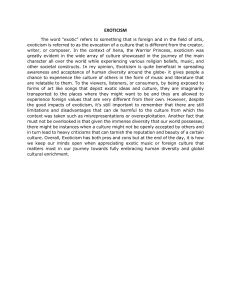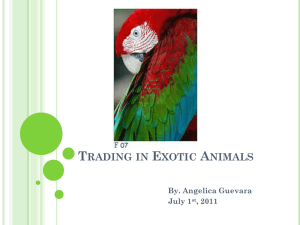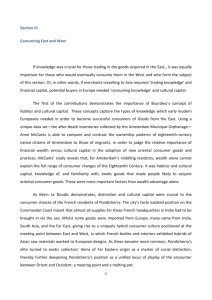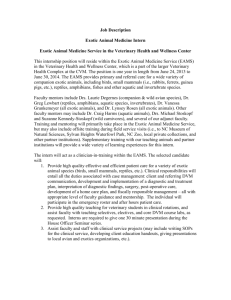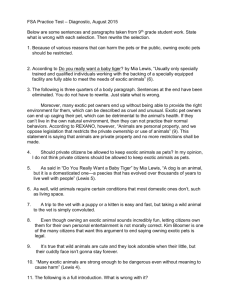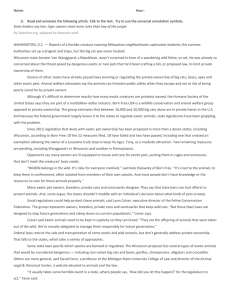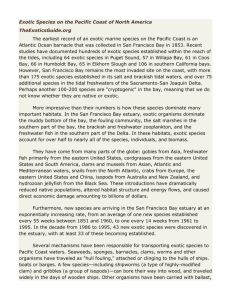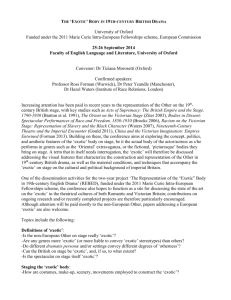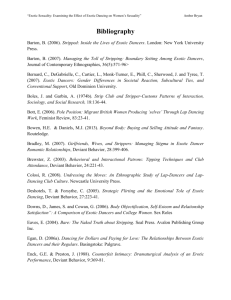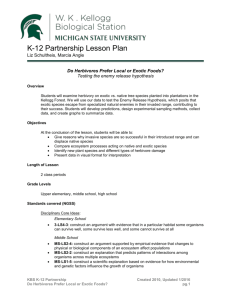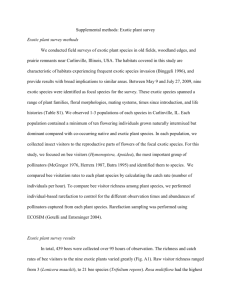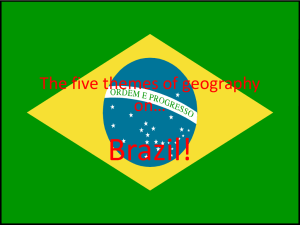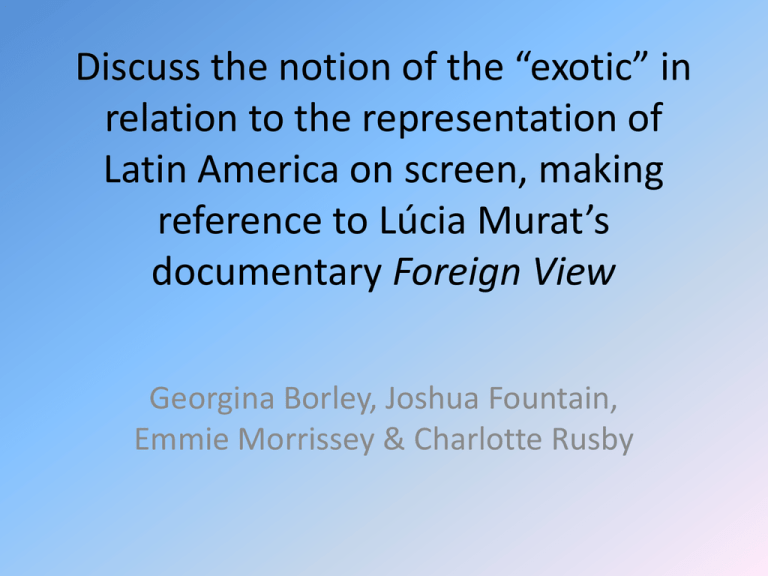
Discuss the notion of the “exotic” in
relation to the representation of
Latin America on screen, making
reference to Lúcia Murat’s
documentary Foreign View
Georgina Borley, Joshua Fountain,
Emmie Morrissey & Charlotte Rusby
•
•
•
•
•
•
•
•
•
•
What do we mean by “exotic”?
About Foreign View and Lúcia Murat
The exotic as comical
The exotic as sexual
The exotic as a threat
Exoticism essentialised
Consequences of exotic stereotypes
Side note on Eurocentric view of the exotic
List of films mentioned
Bibliography
What do we mean by “exotic”?
•
•
•
•
Charm of the unfamiliar
Striking or out of the ordinary
Commonly misunderstood, inherent quality
“aesthetic perception - one which renders
people, objects and places strange even as it
domesticates them, and which effectively
manufactures otherness even as it claims to
surrender to its immanent mystery” (Huggan,
2001, p.13)
• “fetishised otherness” (Huggan, 2001, p.14)
About Foreign View and Lúcia Murat
•
•
•
•
•
Olhar Estrangeiro
2006
Clichés and stereotypes of Brazil
Brasil Documenta and international film festivals
“a fun and fascinating look at how stereotypes
are born, packaged and sold to audiences the
world over” (Jacqueline Rush Rivera)
• O Brasil dos gringos – Tunico Amâncio
The exotic as comical
Carmen Miranda:
•
•
•
•
Pronunciation
Speed of speech
Exaggeration
“Carmen Miranda constituted a
most remarkable caricature of
woman. Behind the peerless
vulgarity of her costumes and
ornaments, tutti-frutti hats and
necklaces, frilly sleeves and multicoloured skirts, lurked a
transvestite.” (Johnson and Stam,
1995, p.360)
Supporting characters:
• Stereotypical roles or jobs
• Witty one-liners
• Si tu vas à Rio, tu meurs (1987)
The exotic as sexual
• “charming, fun, to be
played with or desired,
but always
irretrievably ‘other’.”
(Swanson, 2009, p.3)
• “The camera roves
fetishistically over the
colourful bodies of
performing Latins”
(Swanson, 2009, p.11)
• Wild Orchid (1990)
The exotic as a threat
• The Simpsons, Blame it
on Lisa
• “spectre of Latin
sexuality’s implicit
threat” (Swanson,
2009, p.6)
• José Zúñiga’s character
in Next Stop
Wonderland (1998)
Exoticism essentialised
• On del Rio: “Hers was a vague upper-class exoticism
articulated within a general category of ‘foreign/other’
tragic sensuality” (López, 1993, p.71)
• “did not have a specific national or ethnic provenance,
simply an aura of foreignness” (López, 1993, p.71)
• Michael Caine
• Brenda Starr (1989)
• Next Stop Wonderland (1998)
• Blame it on Rio (1984)
• Wild Orchid (1990)
Consequences/Implications
•
•
•
•
Missed economic opportunities for Brazil
Misrepresentation of Brazil by foreigners
Misrepresentation of Brazil by Brazil
The “exotic” ideas of Brazil overshadow other
important aspects of culture or history
• Brazilian paranoia
Eurocentric view of “exotic”
• “While the international sex tourism industry
in Brazil reflects a fascination on the part of
foreign visitors with the ‘exotic’ mulata and
black woman, many young Southern women
of Northern European ancestry and colouring
migrate to urban areas where they are prized
for their exoticism by Brazilians.” (Shaw and
Dennison, 2007, p.168)
List of films mentioned in Foreign View
•
•
•
•
•
•
•
•
•
•
•
•
•
•
•
Blame it on Rio. 1984. USA. Stanley Donen
The Champ. 1979. USA. Franco Zeffirelli
L’homme de Rio. 1964. France. Phillippe De Broca
Sällskaps Resor [The Charter Trip]. 1980. Switzerland. Lasse Åberg
Next Stop Wonderland. 1998. USA. Brad Anderson
Si tu vas à Rio...tu meurs. 1987. France. Philippe Clair
T’empêches tout le monde de dormir! 1982. France. Gérard Lauzier
Samba. (never finished). USA. David Weisman
Wild Orchid. 1990. USA. Zalman King
The Forbidden Dance. 1990. USA. Greydon Clark
Anaconda. 1997. USA. Luís Llosa
Brenda Starr. 1989. USA. Robert Ellis Miller
The Burning Season. 1994. USA. John Frankenheimer
Le fils du Français. 1999. France. Gérard Lauzier
Le grabuge. 1968. France/USA. Édouard Luntz
Bibliography
Articles
Kingstone, S., 2007. No stereotypes please – we’re Brazilian. BBC News, [online]. Available at:
http://news.bbc.co.uk/1/hi/programmes/from_our_own_correspondent/6383919.stm [Accessed 26 November
2012].
Swanson, P., 2009. Going Down on Good Neighbours: Imagining America in Hollywood Movies of the 1930s and
1940s (Flying Down to Rio and Down Argentine Way), Bulletin on Latin American Research, 28(3), pp.1-14.
Books
AMANCIO, T. 2000. O Brasil dos gringos: imagens no cinema. Niterói, Intertexto.
HUGGAN, G. 2001. The postcolonial exotic: marketing the margins. London, Routledge.
JOHNSON, R., and STAM, R. 1995. Brazilian cinema: expanded edition. New York, Columbia University Press.
SANTAOLALLA, I. 2000. "New" exoticism: changing patterns in the construction of otherness. Amsterdam, Rodopi.
SHAW, L., and DENNISON, S. 2007. Brazilian national cinema. London, Routledge.
Chapters from books
LÓPEZ, A.M., 1993. Are all Latins from Manhattan? Hollywood, ethnography and cultural colonialism. In: King, J.,
López, A.M. and Alvarado, M. eds. Mediating Two Worlds: Cinematic Encounters in the Americas. London: BFI, pp.
67-80.
Films
Olhar estrangeiro, 2006. [Film] Directed by Lúcia Murat. Brazil: Taiga, Limite, Okeanos.
YouTube videos
Carlos Silva, 2009. Simpsons no Brasil. [video online] Available at:
http://www.youtube.com/watch?v=invBjPmY8iE&feature=related [Accessed 21 November 2012].
TuttiFruttiHat, 2011. Carmen Miranda: “Rebola a bola (1941). [video online] Available at:
http://www.youtube.com/watch?v=gQtRPvBlkKY [Accessed 26 November 2012].
QUESTIONS?

